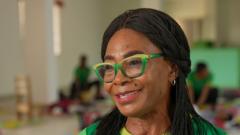Nonye Nweke, a single mother in Nigeria, founded the Cerebral Palsy Centre after facing challenges in finding care for her own daughter, Zimuzo. With an alarming prevalence of cerebral palsy in the country, Nweke’s center provides hope to many children while advocating for better awareness and treatment of neonatal jaundice, a leading cause of the disorder.
A Mother's Fight for Cerebral Palsy Awareness and Care in Nigeria

A Mother's Fight for Cerebral Palsy Awareness and Care in Nigeria
After grappling with stigma and insufficient care for her daughter, a mother establishes the Cerebral Palsy Centre in Lagos, providing critical support to children with neurological disorders.
Babatunde Fashola, fondly known as Baba, is a 22-year-old who weighs only 12 kg (26 lb) and stands at less than 70 cm (2ft 4in) due to cerebral palsy, a condition that has led him to rely on lifelong support. After being abandoned by his parents, Baba found a new home at the Cerebral Palsy Centre in Lagos, Nigeria, a facility dedicated to children grappling with severe neurological conditions. Nonye Nweke, the founder of the center, shared that Baba is thriving at the center, where caregivers tirelessly provide round-the-clock assistance.
Although cerebral palsy is underreported in Nigeria, health professionals estimate that nearly 700,000 individuals live with the disorder, often resulting from untreated neonatal jaundice, a common yet preventable condition caused by high bilirubin levels. In Nigeria, the inadequacies of the healthcare system mean that many infants do not receive timely treatment. This has placed the country among the top five globally for neurological disorders linked to this condition.
Ms. Nweke established the Cerebral Palsy Centre after facing her own struggles with stigma and lack of care when seeking support for her daughter, Zimuzo, who is now 17. "When I took her to a day-care center, they asked me to take her back because other mothers would withdraw their children. As a mum, it was devastating," she recounted. Her center now offers care for 12 children, although they face financial hurdles with a waiting list of over 100 hopeful families.
The average monthly cost of care at the center amounts to approximately $1,000, a burden in a country where the minimum wage is about $540 annually. Ms. Nweke candidly shared her overwhelming feelings and the societal isolation she experienced after her daughter's diagnosis, stating, "It's the most expensive congenital disorder to manage."
The stigma surrounding disabilities in Nigeria remains pervasive, leading to societal isolation and misconceptions about children with congenital disorders. Some are thought to be bewitched or spiritually damaged, resulting in abandonment and neglect.
To combat these issues, the Oscar Project has launched in Lagos, focused on addressing the treatment and diagnosis of neonatal jaundice. The initiative, inspired by a disability advocate whose own untreated jaundice led to cerebral palsy, aims to equip healthcare facilities and train health workers to prevent cases of neurological disorders among newborns.
The project aspires to touch the lives of 10,000 mothers and screen 9,000 children, all while promoting essential knowledge about early detection and treatment options. Although progress is incremental in Nigeria’s overstretched public health system, advocates like Oscar Anderson are determined to shift the narrative surrounding neonatal jaundice and disabilities.
This effort symbolizes a broader movement—a commitment to ensure every baby in Nigeria is safeguarded against preventable conditions while fostering an inclusive society.


















